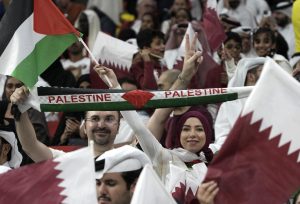At the World Cup in Qatar, Palestinian flags can be seen flying.
Arab supporters and officials are using the World Cup in football as a platform to raise awareness to the plight of occupied area.

As the Israeli-Palestinian conflict makes its presence felt during the first FIFA World Cup 2022 on Arab land, Palestinian flags are flying everywhere in Qatar, but Israeli fans are keeping a low profile. DOHA: Palestinian flags are flying everywhere in Qatar.
In spite of efforts by certain Arab countries, though not Qatar’s, to normalise their relations with Israel, the Palestinian cause is gaining support from a significant number of Arab supporters and from some politicians.
Interactions between Arab supporters and Israeli media have gone viral, including footage shot by an AFP journalist of a Saudi fan berating an Israeli TV reporter. This video has been viewed more than 5.4 million times on Twitter. Another interaction between an Israeli fan and an Arab supporter has also gone viral.
Moav Vardi, a reporter for Israel’s national broadcaster Kan, was confronted by a fan who shouted at him, telling him, “There is only Palestine, there is no Israel… you are not welcome here.”
The Arab supporters that have been flooding Qatar have been refusing to engage with Israeli journalists, however some of them have been heard shouting “Long Live Palestine” in front of television cameras that are Israeli.
Vardi told AFP that “we find it very difficult to work here,” and he added that he understood the indignation of the Arabs.
A significant number of Qataris have been seen hanging the flag of the Palestinian state alongside their country’s flag from the rear windows of their fancy vehicles.
Some Qataris seated in the VIP area of a stadium have been seen wearing armbands depicting the Palestinian keffiyeh headdress, while the song “Ali Al-Keffiyeh” (Raise Your Keffiyeh) is often played in fan zones representing the Palestinian people.
Yahya Abu Hantash, a Palestinian resident of Doha who is 33 years old, stated that several foreigners are unfamiliar with the flag of Palestine and ask them questions about it.
Abu Hantash, who was holding a Palestinian flag and wearing a football shirt from Qatar, claimed that “this is a perfect occasion to expose our cause.” He was speaking while wearing the shirt.
Qatar maintains its position as a supporter of the Palestinian struggle for statehood despite the fact that it has no diplomatic ties with Israel.
In addition, the prosperous emirate contributes critically important financial assistance to the people living in the Gaza Strip, which has been subject to an Israeli-led blockade since since 2007.
Qatar has voiced its disapproval of plans by a number of other Arab nations, such as the United Arab Emirates, Bahrain, and Morocco, to normalise relations in the year 2020.
While Palestinian emblems are commonplace, an Israeli fan who identified himself as Haim stated that this was his fourth World Cup, but the first time he had attended the tournament without bringing the country’s flag with him.
“I can’t help but feel as though I’m watching a spoof of the World Cup. The vibe that we get from the environment is unfriendly, “added Haim, who had also removed the silver Star of David pendant that customarily hung around his neck. “I’m sorry,” he said.
As part of its “Safe World Cup” campaign, the Israeli government urged football supporters to conceal any “symbolic representations” of Jewish culture.
Haim, age 57, and his two kids arrived in Cyprus on a charter flight organised by a Cypriot low-cost carrier that left from the Tel Aviv airport.
According to Alon Levy, an Israeli diplomat who was in Doha to organise consular coverage, some 10,000 Israelis are anticipated to be in Qatar for the football event.
As a platform “to promote ties across the Middle East,” FIFA praised an arrangement that will allow Palestinians and Israelis to travel to a Gulf emirate on special charter flights departing from Tel Aviv.
As a condition for granting the direct flights, which will come to an end after the World Cup final on December 18, Qatar asked that Palestinians be permitted to travel alongside Israelis as a condition for allowing the flights.
According to officials in charge of transportation, there were no Palestinians on either of the first two direct flights, but it was anticipated that there would be some on the third journey, which was on Tuesday.
According to a Palestinian official who spoke on the condition of anonymity, “no one” has discussed the flying arrangement with the Palestinian Authority, which has its headquarters in the West Bank that is now under Israeli occupation. “The television was our source for news,” we said.
Since the Six-Day War, which was fought in 1967 between Israel and many Arab states, Israel has occupied the Palestinian lands of east Jerusalem and the West Bank.
According to the official, the majority of Palestinians travel to Qatar via Jordan or Egypt because Israel places significant restrictions on entry to Tel Aviv’s airport.
Qatar has a total population of approximately 2.9 million people, the vast majority of whom are citizens of other countries. There are approximately 250,000 Palestinians living in Qatar.
Strong support for Palestine can be seen among fans from various Arab countries, notably those from Saudi Arabia, Tunisia, and Morocco, who are all competing in this year’s World Cup. These fans number in the tens of thousands at the very least.
A Jordanian boy named Suhaib Al-Issa, who is only 16 years old, said that flying the flag was a sign of “peaceful resistance to express our rejection of normalisation with a country that occupies Palestine.” Suhaib Al-Issa was quoted as saying that.
The government of Qatar did not immediately issue a statement regarding the treatment of Israeli nationals when the World Cup was taking place.











































